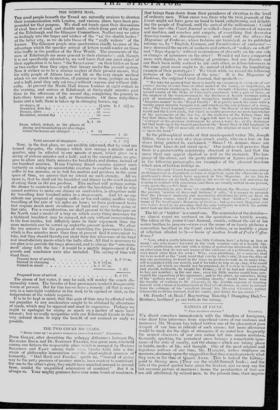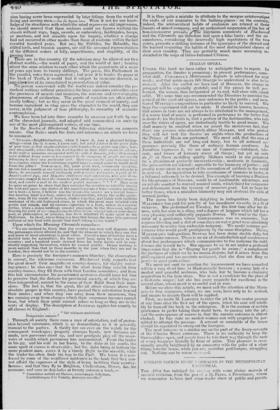NATIVES AT FAULT.
" Mas incuriosa suorum." TACIT US.
WE divert ourselves immoderately with the blunders of foreigners, who draw false inferences from superficial views of our customs and manners ; AI (CRIER has indeed written one of the pleasantest jeux d'esprit of our time in ridicule7 of such errors : but more allowance would be made for the slips of strangers, if we noted how frequently the acutest observers of our own nation fall into similar mistakes. Generally speaking, the periodical press betrays a remarkable igno- rance of the state of society, and the changes which are taking place in habits, modes of life, and thought. One of the most original and ingenious authors of our time, Mr. HAzorrr, writes strictures on manners,obviously upon the supposition that they remain precisely what they were in the time of Queen ANNE. :CTIliS is indeed the halting- point to literary men. t They see the Weald through 'hooks; and the wits of the period quoted have given the liveliest, and we may say the; last accurate picture of manners ; hence the peculiarities of that age' are still attributed, by retired men, to the present time, their impres• sion having never been superseded by later tidings from the world of living arid moving men,—`40, VrtY Be0701 imv. Were it not for our know- ledge of the steadiness with which the mind reposes on old impressions, we should marvel that these recluses could see figures walking the streets without wigs, bags, swords, or embroidery, fardingales, hoops, or mantuas, and not stumble upon the inquiry, whether a change had not occurred in other modes than those of costume within the last eventful hundred years. But no ; the Fribbles, the Bobadils, the Stilted lords, and boorish squires, are still the assumed representatives of the different orders of folly, impertinence, and stupidity, of the passing hour.
There are in this country (if the solecism may be allowed us) two distinct worlds,—the world of paper, and the world of fact ; bearing
iabout the same relation to each other which the pound-note of a score of years ago bore to twenty shillings. The press, like Parliament in ithe parallel, votes them equivalent ; but were it to tender its paper at ' the bank of Truth, it would find it subject to immense discount, in • nsiderat ion. of ata_ansostained representation of valme..,. ' No per-ion conversant With-the world can indeed consider the pe- riodical writings without perceiving the large omissions extending over the provinces of morals and manners, the curious and ever-changing pheenomena of civilization. The points of variation are often intrin- sically trifling ; but as they occur in the great element of society, and become ingredient in what gives thecharacter to the world, they can never, in the judgment of true philosophy, be unworthy of accurate contem plat ion.
We have been led into these remarks by an error put forth by one of the shrewdest journals, and adopted and commented on anew by one of the most philosophical writers, of our time. - In the Noctes of Blackwood, the following stricture on manners occurs. Our Italics mark the facts and inferences on which we have to comment. . .
" TICKLER—Brighthelmstone, when I knew it, was a pleasant fishing- village—what like it is now, I know not ; but what I detest in the g.rwit folks rti your time, is that insane St.!! ishill'sS 71' hirit 711t1kex Owen pre:fiT tiny place, laac.. ever abominable, where they ran lo rd together in their little c.rauisile rotr,rie,.;, to thf! 7mhle■I 10,015iOn,s' R lEr loWntlell With Ulf • wibirs t el0011 1 ; n g, ll'IPT,' 1 /Icy 0117710t exist without being B1 fire hi frs.S. eXprp:ea 10 the Mittplity of ve,ple iv,t exactly hetonging to their own inf rtirillar sect. How c:Iii :iocictv an together long in a country where the Corinthian capital takes so much !mins to unrift itself from the pillar ? Now-a-days, Sir, your great lord, commonly speaking, spends but a month or six weeks in his ancestral abode ; and even when he is • there, he sumunds himself studiously with a evIrs,,. tow n -tow:, a pIrk of St. JOMCS'S-Street fins, and May-fitir chat, efer,; and iati.;.2.aers, friii, L,.;,.e ij,,,m_ selves airs enough to turn the stomach8 ql 11/C pl(tin ..,( pr i rot r dr!! awl 1 bri r 1(0, 110 0_ kind, and render a visit to the castle a taa:lect nuisance. l' " * They seem to spare no pains to show that they consider the country as valuable merely for rent and game—the duties of the magistracy are a bore—county meetings -are a bore—a farce, I believe was the word—the assizes are a cursed bore- . fox-hunting itself is a bore, unless in Leicestershire, where the noble sports- men, from all the winds of heaven, cluster together, and think with ineffable contempt of the old-fashioned chase, in which the great man Mingled with gentle and simple, and all-corners—sporting is a bore, unless in a regular .buttue, when a dozen lordlings murder pheasants by the thousand, without hearing the cock of one impatricianfowling:`,,licce—,.e:cept indeed some dandy poet, or philosopher, or punster, has been admitted to make sport to the Philistines. In short, every thing is a bore that brings the dons into personal .collision of any kind with people that don't belong to the world."
Upon which the Morning Chronicle remarks- " We are inclined to think that the country can very well dispense with the personages above alluded to, and that the element in which they can live . and move to most advantage is great cities. Except a man of fortune have a decided taste for agriculture, his time must hang; upon his hands in the country ; and a hundred wants derived from his town habits will be con- stantly suggesting themselves, which he cannot gratify. Hence nothing is more natural than that in those months in the year when they are not in London, they should not be in the country."
Here is precisely the foreigner's common blunder ; the observation is correct, the inference erroneous. B/aekwood truly remarks that the great desert their magnificent country-houses, for shabby water- ing-places ; he also says that for the short term tliey inhabit their country-houses, they fill them with their London associates ; and from this last circumstance his accustomed acuteness should have led bun . to perceive that‘the distaste for provincial society, of which they are thus independent, cannot be the cause of their flight from their man- sions. The fact is, that the great, like all other classes above the absolute pauper in this country, have pushed their ostentation beyond their means ; and when they run away from their mansions, they *re running away from charges which their enormous incomes cannot bear, but which their pride cannot refuse so long as they are in the seats of display. The description of JUVENAL applies too exactly to all classes in England : "tile vivimus ambitiosl
Paupertate omnes."
! Through all society there rims a race of ostentation, and of preten- sion beyond substance, which is as demoralizing as it is generally ruinous to the parties. A thrifty few are ever on the watch for the consequent wreckag,es; property changes hands, new fortunes are made, new parvenus shoot up, and new prodigals play off the reser- voirs of wealth which parsimony has accumulated. From the trader in his gig, and his wife in her finery, to the duke in his castle, the same spirit of excess is observable ; but the duke being at bottom the more prudent man, cures it by a timely flight to the sea-side, while the trader too often finds his way to the Fleet. We know it is con- fessed by some of the wealthiest noblemen in the land, that they can- not afford the expenses of the style of living befitting their country- houses ; and that they fly to Brighton, Cheltenham, Dover, &c. for economy. and save in dog-holes at twenty guineas a week,—
" Translatus subito ad Marsos, mensamque Sabellam,
Contentusque laic Veneto, daroque cocullo." It is thus quite a mistake to attribute to the morgue aristocratique the visits of our magnates to the bathing-places : on the contrary, indeed, the aristocratical habits of exclusion are relaxed at those haunts of mixed company, and an understood suspension of the law of
on-intercourse prevails. /the -iiigenibus comments of Blackwood and the Chronicle are therefore laid upon a false basis ; and the cir curnstance, considering the deservedly high reputations of the two, prints, presents a striking instance of the ignorance of the shrewd and the learned respecting the habits of the most distinguished classes of their own country. They are probably much more accurately in- structed in the ways of thrice-buttoned Chinese.



















 Previous page
Previous page